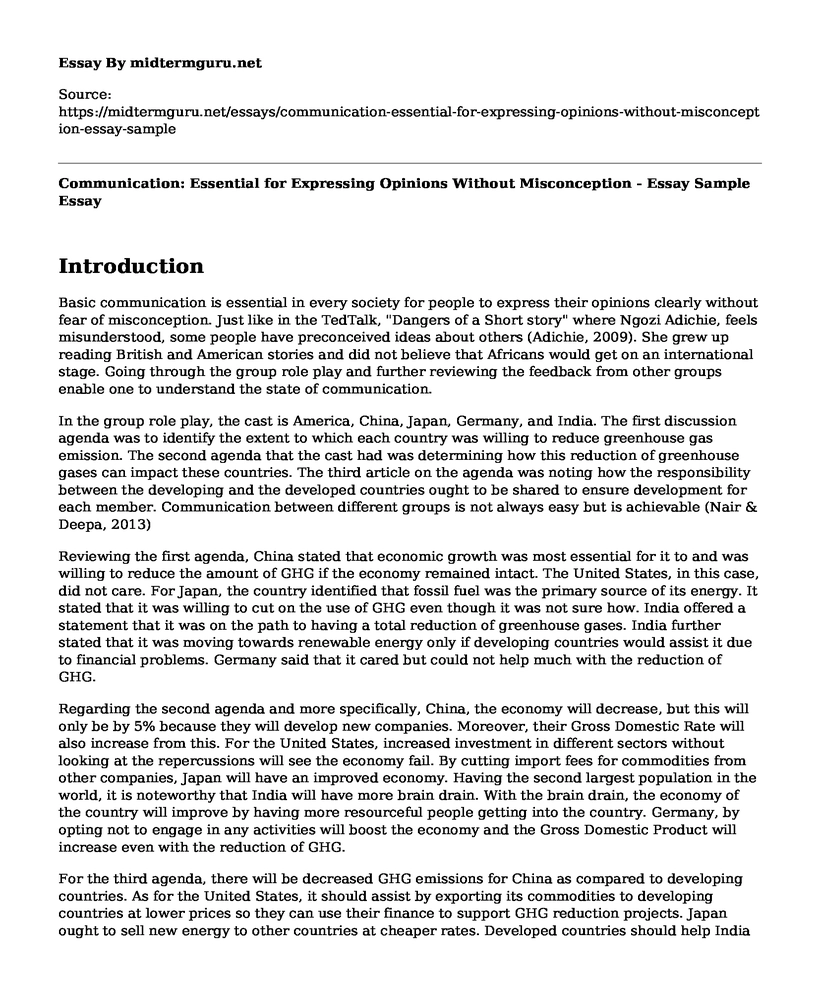Introduction
Basic communication is essential in every society for people to express their opinions clearly without fear of misconception. Just like in the TedTalk, "Dangers of a Short story" where Ngozi Adichie, feels misunderstood, some people have preconceived ideas about others (Adichie, 2009). She grew up reading British and American stories and did not believe that Africans would get on an international stage. Going through the group role play and further reviewing the feedback from other groups enable one to understand the state of communication.
In the group role play, the cast is America, China, Japan, Germany, and India. The first discussion agenda was to identify the extent to which each country was willing to reduce greenhouse gas emission. The second agenda that the cast had was determining how this reduction of greenhouse gases can impact these countries. The third article on the agenda was noting how the responsibility between the developing and the developed countries ought to be shared to ensure development for each member. Communication between different groups is not always easy but is achievable (Nair & Deepa, 2013)
Reviewing the first agenda, China stated that economic growth was most essential for it to and was willing to reduce the amount of GHG if the economy remained intact. The United States, in this case, did not care. For Japan, the country identified that fossil fuel was the primary source of its energy. It stated that it was willing to cut on the use of GHG even though it was not sure how. India offered a statement that it was on the path to having a total reduction of greenhouse gases. India further stated that it was moving towards renewable energy only if developing countries would assist it due to financial problems. Germany said that it cared but could not help much with the reduction of GHG.
Regarding the second agenda and more specifically, China, the economy will decrease, but this will only be by 5% because they will develop new companies. Moreover, their Gross Domestic Rate will also increase from this. For the United States, increased investment in different sectors without looking at the repercussions will see the economy fail. By cutting import fees for commodities from other companies, Japan will have an improved economy. Having the second largest population in the world, it is noteworthy that India will have more brain drain. With the brain drain, the economy of the country will improve by having more resourceful people getting into the country. Germany, by opting not to engage in any activities will boost the economy and the Gross Domestic Product will increase even with the reduction of GHG.
For the third agenda, there will be decreased GHG emissions for China as compared to developing countries. As for the United States, it should assist by exporting its commodities to developing countries at lower prices so they can use their finance to support GHG reduction projects. Japan ought to sell new energy to other countries at cheaper rates. Developed countries should help India by investing there more and thus seeing the quality of life in the country increasing. Germany should increase trade with foreign countries and use some of the profits to assist developing countries.
Other groups have also offered feedback on the agendas and have commended the good balance between countries. They have also said that the agenda was clear and easy to comprehend, though wrong to some extent. The other group also noticed that the fact the agenda summarized the opinions, the discussions were good but on the downside, not enough knowledge. The setting of the countries such that they came from different regions was also accurate.
From the information presented, one can identify there are some communication problems between countries where they have different perspectives, even being from the same region. Just like in Adichie's "The Danger of a Single Story," the communication barrier is rather detrimental where in her story; she was not pleased with her roommate's misconception of Africa (Adichie, 2009). In the given case, it is impossible to have the three given countries comprehending each other appropriately.
References
Nair, B & Deepa, S. (2013). Basic Communication and Information Engineering. New Delhi: I.K. International Pvt Ltd.
Adichie, C. (2009, July). The Danger of a Single Story. [Video file]. Retrieved on 6th July 2019. www.ted.com/talks/chimamanda_adichie_the_danger_of_a_single_story?language=en#t-310497
Cite this page
Communication: Essential for Expressing Opinions Without Misconception - Essay Sample. (2023, Jan 14). Retrieved from https://midtermguru.com/essays/communication-essential-for-expressing-opinions-without-misconception-essay-sample
If you are the original author of this essay and no longer wish to have it published on the midtermguru.com website, please click below to request its removal:
- Essay on Womens Rights Movement and Inequality From the Past to Present
- Nursing Articles on Patients With Substance-Use Disorder in Pain
- Trump Immigration Ban - Essay Sample
- ISIS: A Comprehensive Examination of the New Face of Modern Terrorism - Research Paper
- Race, Social Stratification & Ethnic Studies in Contemporary Society - Essay Sample
- Representation of White Law Enforcement and Judicial System
- Addiction: A Disease or Not? - Essay Sample







